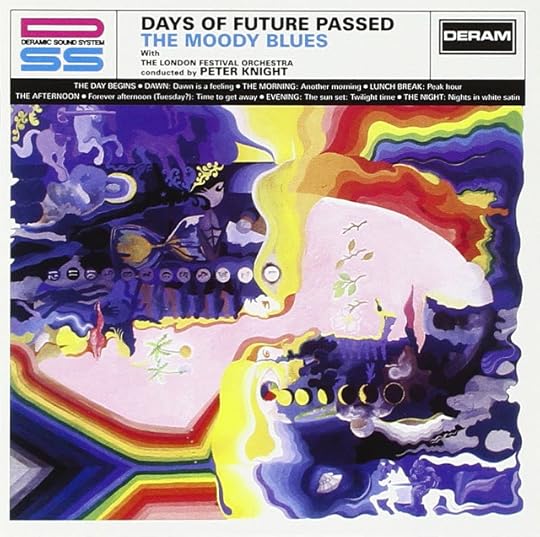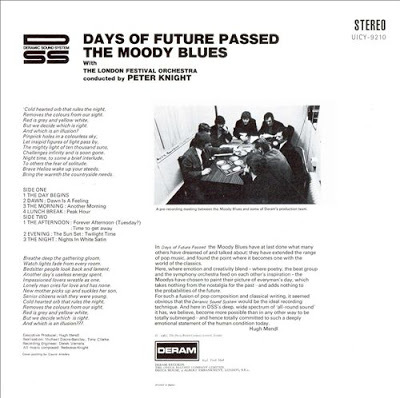Days of Future Passed
 The Beatles' art-rock milestone, Sgt. Pepper, is the LP most closely associated with the Summer of Love in its sound collages and psychedelic undertones, a veritable checklist for everything '67, yet despite its status as the greatest album of all time, what it is not, is evolutionary; instead Sgt. Pepper is a conceptual progression from Revolver. What's truly amazing is that before the end of the year, The Beatles would release the EP, Magical Mystery Tour and the singles "Strawberry Fields," "Hello Goodbye," "Penny Lane," "All You Need is Love" and "Baby, You’re a Rich Man." There is no arguing that 1967 was the year of The Beatles.
The Beatles' art-rock milestone, Sgt. Pepper, is the LP most closely associated with the Summer of Love in its sound collages and psychedelic undertones, a veritable checklist for everything '67, yet despite its status as the greatest album of all time, what it is not, is evolutionary; instead Sgt. Pepper is a conceptual progression from Revolver. What's truly amazing is that before the end of the year, The Beatles would release the EP, Magical Mystery Tour and the singles "Strawberry Fields," "Hello Goodbye," "Penny Lane," "All You Need is Love" and "Baby, You’re a Rich Man." There is no arguing that 1967 was the year of The Beatles.1967 was also the year of Are You Experienced and Disraeli Gears, of Surrealistic Pillowand The Velvet Underground and Nico, but the most influential and impactful release from 1967 (and I am hard-pressed to discount The Velvets) is The Moody Blues' Days of Future Passed.
Commissioned to record a stereophonic rock 'n' roll version of Dvorak's New World Symphony , the band was given a top-notch producer (Tony Clarke), a full orchestra, and conductor/arranger Peter Knight. Though initial sessions went well, there was little heart in the project. With an orchestra on hand, the band were able to convince Clarke and Knight to record the group's own songs. Though Decca was initially appalled that the band would be brash enough to hijack the project, they let it go through. The result was Days of Future Passed, an AM9.
Days of Future Passed (AM9)Artist: The Moody Blues Released: November 11, 1967 (UK) Deram Records, April, 1968 (US) Decca Records Executive Producer: Hugh Mendl Recording Engineer: Derek Varnals Cover painting by: David Anstey Singles: (UK release dates unless otherwise noted): Nov 10, 1967: Nights In White Satin/Cities; Jul 20, 1968: Tuesday Afternoon (Forever Afternoon)/Another Morning (US release); July 1972: Nights in White Satin (US Re-release).Personnel: Justin Hayward: Acoustic and electric guitars, piano, keyboards, vocals; John Lodge: Bass, electric guitar, vocals; Mike Pinder: Keyboards, mellotron, piano, vocals; Ray Thomas: Flutes, horns, percussion, keyboards, vocals; Graeme Edge: drums percussion, vocals.
Wait, not in the Rolling Stone top 500? Not in 1001 Albums to Hear Before You Die? Kidding, right? The very first prog album; the first album to utilize a full orchestra; a freakin' overlooked masterpiece, huh?
What appears today as run of the mill (hardly) was ground-breaking in 1967. The idea of fusing psychedelic rock with orchestral arrangements was an improbable marriage. The Moody Blues somehow made it work, before the Beatles, without making it overly-produced or overtly pompous. A true concept album, Days of Future Passed is thematic in that it follows a day's activity. As "The Day Begins" Graeme Edge commands the sun to rise. The optimism of the early morning is reflected in Michael Pinder's "Dawn is a Feeling" and in Ray Thomas' "Another Morning". By the afternoon, the recording takes on a surreal quality typical of later psychedelic recordings; indeed, John Lodge's compositions ("Peak Hour", "Forever Afternoon") are truly inspired. Despite the "typical day," the symphonic arrangements with the London Festival Orchestra are far from ordinary.
 The optimism fades a bit as the day wears on. The recording closes with Justin Hayward's landmark "Nights In White Satin," which, in a bittersweet way, drains away the early euphoria. Edge recites a "Late Lament" that commands the listener to "Breathe deep the gathering gloom." Really, Rolling Stone? Days of Future Passed laid the groundwork for symphonic psychedelia, rock and pop music. Later acts such as King Crimson, Emerson, Lake and Palmer, Procol Harem and the Electric Light Orchestra would follow in the footsteps of this release, as would the Beatles. It was monumental then; it is monumental now and its snub from the Top 500 is a travesty. Madonna's Immaculate Collection, a greatest hits album(!), makes it, Janet Jackson's Rhythm Nation makes it, Big Star? Who the fuck? Twice, no less; but no Days. If you listen to Rhythm Nation before you die, and you haven't listened to this, we at AM are so, so sorry.
The optimism fades a bit as the day wears on. The recording closes with Justin Hayward's landmark "Nights In White Satin," which, in a bittersweet way, drains away the early euphoria. Edge recites a "Late Lament" that commands the listener to "Breathe deep the gathering gloom." Really, Rolling Stone? Days of Future Passed laid the groundwork for symphonic psychedelia, rock and pop music. Later acts such as King Crimson, Emerson, Lake and Palmer, Procol Harem and the Electric Light Orchestra would follow in the footsteps of this release, as would the Beatles. It was monumental then; it is monumental now and its snub from the Top 500 is a travesty. Madonna's Immaculate Collection, a greatest hits album(!), makes it, Janet Jackson's Rhythm Nation makes it, Big Star? Who the fuck? Twice, no less; but no Days. If you listen to Rhythm Nation before you die, and you haven't listened to this, we at AM are so, so sorry.
Published on November 11, 2019 04:05
No comments have been added yet.



